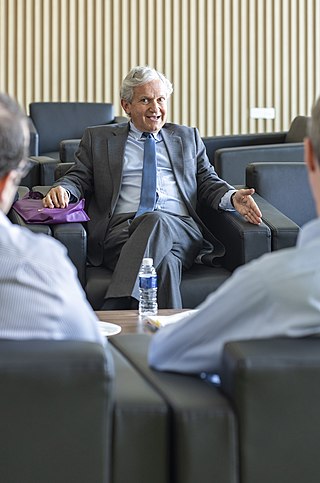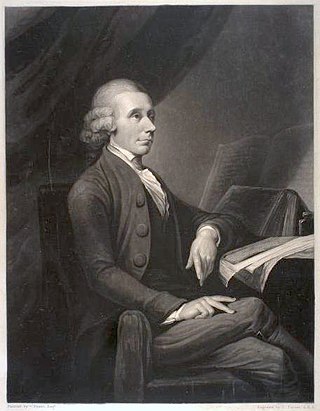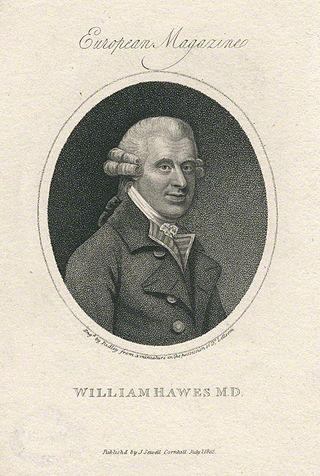Related Research Articles
Peter Stent was a seventeenth-century London printseller, who from the early 1640s until his death ran one of the biggest printmaking businesses of the day.

The Keeper or Master of the Rolls and Records of the Chancery of England, known as the Master of the Rolls, is the President of the Civil Division of the Court of Appeal of England and Wales and Head of Civil Justice. As a judge, the Master of the Rolls is second in seniority in England and Wales only to the Lord Chief Justice. The position dates from at least 1286, although it is believed that the office probably existed earlier than that.
The Morning Star was a radical pro-peace London daily newspaper started by Richard Cobden and John Bright in March 1856. It had substantial support from Joseph Sturge.

The Theological Repository was a periodical founded and edited from 1769 to 1771 by the eighteenth-century British polymath Joseph Priestley. Although ostensibly committed to the open and rational inquiry of theological questions, the journal became a mouthpiece for Dissenting, particularly Unitarian and Arian, doctrines.

The British Poet Laureate is an honorary position appointed by the monarch of the United Kingdom, currently on the advice of the prime minister. The role does not entail any specific duties, but there is an expectation that the holder will write verse for significant national occasions. The origins of the laureateship date back to 1616 when a pension was provided to Ben Jonson, but the first official holder of the position was John Dryden, appointed in 1668 by Charles II. On the death of Alfred, Lord Tennyson, who held the post between November 1850 and October 1892, there was a break of four years as a mark of respect; Tennyson's laureate poems "Ode on the Death of the Duke of Wellington" and "The Charge of the Light Brigade" were particularly cherished by the Victorian public. Three poets, Thomas Gray, Samuel Rogers and Walter Scott, turned down the laureateship. The holder of the position as at January 2023 is Simon Armitage who succeeded Carol Ann Duffy in May 2019 after 10 years in office.

The Lieutenant of the Tower of London serves directly under the Constable of the Tower. The office has been appointed at least since the 13th century. There were formerly many privileges, immunities and perquisites attached to the office. Like the Constable, the Lieutenant was usually appointed by letters patent, either for life or during the King's pleasure.

Justice of the Common Pleas was a puisne judicial position within the Court of Common Pleas of England and Wales, under the Chief Justice. The Common Pleas was the primary court of common law within England and Wales, dealing with "common" pleas. It was created out of the common law jurisdiction of the Exchequer of Pleas, with splits forming during the 1190s and the division becoming formal by the beginning of the 13th century. The court became a key part of the Westminster courts, along with the Exchequer of Pleas and the Court of King's Bench, but with the Writ of Quominus and the Statute of Westminster, both tried to extend their jurisdiction into the realm of common pleas. As a result, the courts jockeyed for power. In 1828 Henry Brougham, a Member of Parliament, complained in Parliament that as long as there were three courts unevenness was inevitable, saying that "It is not in the power of the courts, even if all were monopolies and other restrictions done away, to distribute business equally, as long as suitors are left free to choose their own tribunal", and that there would always be a favourite court, which would therefore attract the best lawyers and judges and entrench its position. The outcome was the Supreme Court of Judicature Act 1873, under which all the central courts were made part of a single Supreme Court of Judicature. Eventually the government created a High Court of Justice under Lord Coleridge by an Order in Council of 16 December 1880. At this point, the Common Pleas formally ceased to exist.

Essex Street Chapel, also known as Essex Church, is a Unitarian place of worship in London. It was the first church in England set up with this doctrine, and was established when Dissenters still faced legal threat. As the birthplace of British Unitarianism, Essex Street has particularly been associated with social reformers and theologians. The congregation moved west in the 19th century, allowing the building to be turned into the headquarters for the British and Foreign Unitarian Association and the Sunday School Association. These evolved into the General Assembly of Unitarian and Free Christian Churches, the umbrella organisation for British Unitarianism, which is still based on the same site, in an office building called Essex Hall. This article deals with the buildings, the history, and the current church, based in Kensington.
The Society for Promoting the Knowledge of the Scriptures was a group founded in 1783 in London, with a definite but rather constrained plan for Biblical interpretation. While in practical terms it was mainly concerned with promoting Unitarian views, it was broadly based.
The Intelligence Co-ordinator, later Security and Intelligence Co-ordinator was a senior post in the Cabinet Office of the British Civil Service that oversaw the intelligence services and their relationship to the government.

John Alcindor was a physician and activist from Trinidad who settled in London. He is known for his role in the African Progress Union, of which he became president in 1921.

William Hawes M.D. (1736–1808) was an English physician and philanthropist, founder of the Royal Humane Society. As well as his work to spread the practice of resuscitation, he was concerned to relieve poverty in east London.
The Evangelical Magazine was a monthly magazine published in London from 1793 to 1904, and aimed at Calvinist Christians. It was supported by evangelical members of the Church of England, and by nonconformists with similar beliefs. Its editorial line included a strong interest in missionary work.
Edward Theophilus Nelson (1874–1940) was a British barrister and local politician born in British Guiana. In 1910 he attained fame as the 'coloured barrister' who successfully defended Mark Wilde, accused of the murder of George Storrs at Stalybridge.
References
- ↑ Green, Jeffrey. "Alcindor, John". Oxford Dictionary of National Biography (online ed.). Oxford University Press. doi:10.1093/ref:odnb/57173.(Subscription or UK public library membership required.)
- 1 2 Benjamin, Ionie (1995). The Black Press in Britain. Trentham Books. p. 15. ISBN 978-1-85856-028-1 . Retrieved 27 October 2012.
- ↑ Barberis, Peter; McHugh, John; Tyldesley, Mike (26 July 2005). Encyclopedia of British and Irish Political Organizations: Parties, Groups and Movements of the 20th Century. Continuum International Publishing Group. p. 106. ISBN 978-0-8264-5814-8 . Retrieved 27 October 2012.
- ↑ "Society of Peoples of African Origin". Anne Samson – Historian. 3 May 2021. Retrieved 20 February 2023.
- ↑ Davies, Sam. "Nelson, Edward Theophilus". Oxford Dictionary of National Biography (online ed.). Oxford University Press. doi:10.1093/ref:odnb/57262.(Subscription or UK public library membership required.)
- ↑ Dabydeen, David; Gilmore, John; Jones, Cecily (6 May 2010). The Oxford Companion to Black British History. Oxford University Press. ISBN 9780199578771 . Retrieved 27 October 2012., p. 13.
- ↑ Green, Jeffrey. "Tandoh, Kwamina Faux". Oxford Dictionary of National Biography (online ed.). Oxford University Press. doi:10.1093/ref:odnb/97932.(Subscription or UK public library membership required.)
- Killingray, David (1994). Africans in Britain. London: Routledge. ISBN 0-7146-4571-0